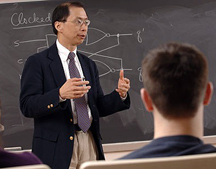Robots and Real-World Problems: Michael Loui Tackles Engineering Education
October 24, 2011
Building robots and designing machines that solve real-world problems—it doesn’t sound like the work of college freshmen, but professors in the College of Engineering at the University of Illinois have found that first-year engineering students are up to the challenge. Problem-based learning is a teaching method that gives students a specific problem to solve and leaves it up to them to come up with the solution. Engineering faculty have been using problem-based learning, or as engineers call it, design laboratory, for years. They have seen the benefits of the technique first-hand: it promotes problem-solving skills, develops creative skills, increases student retention, and promotes students’ confidence in the subject area.

Michael Loui instructing students in one of his courses at Illinois.
While a senior design project is common for most engineering students, and many have opportunities to do this type of work earlier in their education, in Electrical and Computer Engineering, however, students start out with problem-based design projects as early as their first semester with the freshman-level class ECE 110: Introduction to Electrical and Computer Engineering. In this course, students are given the problem of creating a robot that can follow a line. In the ECE 110 laboratory, students work in pairs to create and control their robots. One student wires the circuits and adjusts the multimeter, while the other student records the measurements and checks the work, and the two students switch roles on a regular basis. This teaching method, called structured pairing, was introduced by Michael Loui, a professor of electrical and computer engineering and a member of the team that developed ECE 110. “Between the laboratory sections with structured pairing and the sections without, the students did equally well on the final exam, but the students in the structured pairing sections reported higher levels of confidence and satisfaction,” Loui found. These higher levels of confidence may affect retention, especially for women.
Loui is part of a growing movement across the country that focuses on engineering education research. Organizations including the National Science Foundation and the National Academy of Engineering now recognize this as an important area of research, and several universities now have programs for science and engineering education, and some even have research centers for the purpose of studying education in these fields. “There are people doing chemistry education research, biology education research, physics education research. We have a Physics Education Research group here at the College of Engineering, which is very good. But the number of students interested in discipline-based education research in any one department is very small,” Loui said.
Loui and other colleagues, including I-STEM Director Lizanne DeStefano, are pursuing the possibility of offering a graduate minor in science and engineering education at Illinois. Loui hopes that a minor will bring together students and faculty with related interests and create a community that will offer support to its members. According to Loui, what the field needs more of is pedagogical content knowledge, which means knowing the best ways to teach certain concepts within a given discipline. “We do know lots of basic principles of good college teaching,” Loui said, but he believes that there is room for improvement.
Loui’s interests in the non-technical aspects of engineering also include the study of engineering ethics and students’ experiences at the university. He has developed a series of videos on engineering ethics and directs a summer undergraduate research program. He is also a co-principal investigator for the National Center for Professional & Research Ethics in the Coordinated Science Laboratory at Illinois, and he serves as an executive editor of the journal College Teaching.
Author: Christy Glaze, Office Support Specialist, I-STEM Education Initiative
More: Faculty Feature
, Undergrad Education Reform, Graduate Education Reform













.jpg)
















